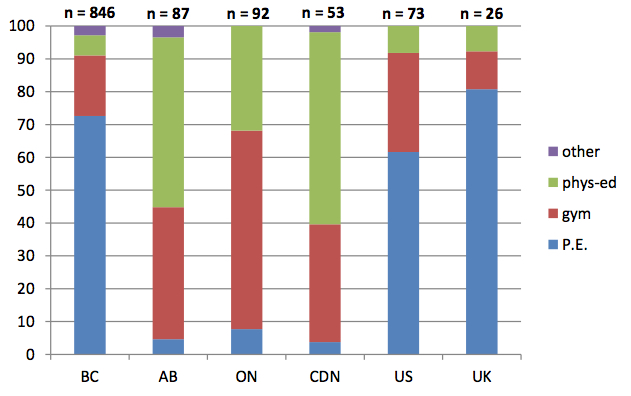Quick links
P.E.
DCHP-2 (Dec 2014)
Spelling variants:PE
n. abbreviation — British Columbia, Education
physical education: a school subject of active exercise and sports training, typically offered in primary and secondary schools.
Type: 5. Frequency — The term P.E. is one of the items that sets British Columbia apart from the rest of Canada. BC has been identified as a dialect region within Canada based on phonology, while less has been done to study distinctive patterns in lexis (see, e.g. Dollinger & Clarke 2012: Table 1, based on Boberg 2008, 2005). The patterning of P.E. shows that potential lexical markers for BC warrant more study. Gregg (1995), who uses substantial BC data from the late 1970s, had no data to compare BC English with that of the rest of Canada, yet he offers a useful starting point for such a study.
P.E. shows a profoundly BC dimension. As an analysis by Chen (2014), reproduced in Chart 1, shows, more than 70% of British Columbians report P.E. as the name of the school class (n=846), while in Alberta and Ontario, but also overall in the rest of Canada, the percentage is less than 10%. With this term, BC patterns with the US data from the BC Linguistic Survey from 2014 (Dollinger 2015b: 262-4), where more than 60% report the term (n=73 and small) and even more in the UK comparative sample (but n is low; n=26). Outside of BC, the preferred terms are "gym" or "phys-ed", a shortening of "physical education". The quotations demonstrate the near-unique status of P.E. as a linguistic marker of BC English within Canada, as they are exclusively from that province.
P.E. shows a profoundly BC dimension. As an analysis by Chen (2014), reproduced in Chart 1, shows, more than 70% of British Columbians report P.E. as the name of the school class (n=846), while in Alberta and Ontario, but also overall in the rest of Canada, the percentage is less than 10%. With this term, BC patterns with the US data from the BC Linguistic Survey from 2014 (Dollinger 2015b: 262-4), where more than 60% report the term (n=73 and small) and even more in the UK comparative sample (but n is low; n=26). Outside of BC, the preferred terms are "gym" or "phys-ed", a shortening of "physical education". The quotations demonstrate the near-unique status of P.E. as a linguistic marker of BC English within Canada, as they are exclusively from that province.
Quotations
1989
University of B.C. physical education professor Inge Williams says some elementary school PE programs incorporate traditional games from cultures being studied in other classes. "I've seen some real neat programs going on. If the class is studying Japan, they'll not only look at the society and language and do orgami [sic] in art, they'll do Japanese kite flying and dancing in PE."
1994
Another recurring image: I am on the high school soccer field in PE class. There is a rumble and as a team we stop kicking the ball and walk over to the chainlink fence and look through it to the south, far beyond the horizon to where we know Seattle is supposed to be, 110 miles away. Instead of Seattle, we see a pillar of grey dust and rubble pounding on heaven, the earth launched up into the universe, so far up that it will never return -- the earth has become the sky.
2003
PE teachers in intervention schools tried to get students to be more active during classes. For instance, they created games that modified sports like basketball, softball and soccer. The games had different rules and were done with smaller groups so everyone could get more involved and develop skills while having fun.
2011
Luyken made a bit of history as the first Abbotsford athlete to win the B.C. high school boys 100-metre crown. He's also the first Yale athlete to win a gold medal at the senior level at track provincials. "The 100 metres is the most prestigious event in track and field," Wight pointed out. "I taught him in PE last year, and I knew from the outset that if I could get this kid to see the bigger picture, he could do some great things."
2014
Anthony Miller, 20, a junior at the University of California-Berkeley, remembers a day at high school that marked the start - and end - of his athletic career. He was a freshman among several upperclassmen participating in an end-of-the-year kickball game in PE. He had been waiting near the back of the line and ran up to the plate to launch a mighty kick.
References
- Chen (2014)
- Dollinger (2015b)
- Dollinger & Clarke (2012)
- Boberg (2005)
- Gregg (1995)
- Boberg (2008)
Images
